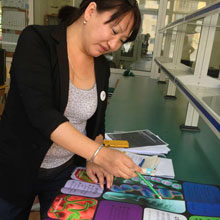Outreach: SGM education posters travel to Mongolia
Issue: Real superheroes
25 February 2014 article

During the summer of 2013, I travelled to Mongolia as part of a training programme for teachers and teacher-trainers supported by Cambridge International Examinations. I took with me some SGM posters, to aid learning and to help raise awareness of microbial science in Mongolia.
The training programme aimed to develop and pilot a new curriculum for Grade 11 Mongolian students (aged 16–17), which could eventually form the basis for the national curriculum in Mongolia. This is part of a much wider programme of work to raise levels of achievement across the country and develop parity between regional schools and those in the capital, Ulan Batar. This particular course was for teachers who taught Biology to students in Grade 11 in the pilot schools located in the regional areas and Ulan Batar. It mainly focused on student-centred learning and introduced ideas about practical work, with sessions conducted via an interpreter. Microbiology features prominently in the pilot version of the new Mongolian curriculum.
Over 30 Mongolian teachers from schools across Mongolia attended the training in Ulan Batar. Some came from as far away as the Kazakhstan border; others came from eastern schools near the Chinese border and from schools in the southern Gobi Desert area. Teachers from the desert were particularly keen to discuss how the microbiology of camel’s milk compared with that of yak milk!
Teachers and teacher-trainers on the programme were delighted to receive copies of the Microbiology Society (SGM) poster ‘Classifying Microbes’. The poster includes helpful visual explanations of familiar microbes. We discussed many ideas around the use of the poster, which included:
- Decorating the classroom walls
- Replacing the English explanations with Mongolian translations
- Hiding all explanations and using it as a ‘test’ for students to identify the organisms
- Hiding all the pictures and leaving the Mongolian text for students to draw the organisms
- Cutting the poster up to make several posters about each microbe
- Extending the poster by adding written and/or illustrated accounts next to each type of microbe
- Cutting up the pictures and text, laminating them and using them for a matching game
- Destroying the poster to make a better one for homework (‘Destroy Homework’)
- Using it to calculate magnification and/or actual sizes
- Using it to help students make models of microbes
- Discussing possible practical work
- Usefulness of different types of microscopes
In their evaluations at the end of the course, and during the microbiology session, teachers and trainers expressed thanks for a successful training programme, made even better by their gift, from the Society, which will be a great resource for future lessons. It made the excess baggage fee worthwhile!
Thanks to Cambridge International Examinations for giving me this opportunity, to Daniel Morrish in particular, for his help and advice in preparing for the training, and to the SGM who organised for 35 of these posters to be delivered to me at short notice to take out to Mongolia.
SUE HOWARTH
Trainer for Cambridge International Examinations and Senior Lecturer, Science Education, University of Worcester WR2 6AJ, UK
SGM is always keen to hear from any members who would like to use our resources for education and outreach activities in the UK or abroad. For more information please see our website (microbiologyonline.org.uk) or contact our Education and Outreach Officer, Theresa Hudson ([email protected]).
